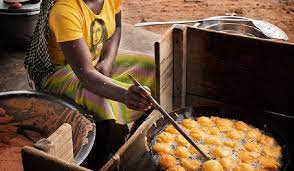For reasons which are kept under wraps, residents of Chukuku, a village near Gwagwalada, host community of the University of Abuja in the Federal Capital Territory, FCT, are forbidden from baking bean cake, a delicacy widely known as Akara.
Ironically, while it is a taboo for residents to bake bean cake, they are free to buy the delicacy from outside the community and eat it within.
Mrs. Junmai Leda, a resident who was born in the community, says she was told by her grandparents of how a woman, who fried Akara in the community decades ago, disappeared without trace.
“The Chief of the community then made a decree that Akara should not be fried in the community again”, she explains.
Though the farming community has a large population of settlers of the Yoruba, Igbo and Hausa extraction, among others, they are barred from baking bean cake in the community.
Malam Bikko Usman, is the Chief of Chukuku, a Gbagyi community. He says it’s a tradition bequeathed by their forefathers.
“It is the frying that is forbidden not the eating. We relocated from one part of the Chukuku village, where we don’t fry Akara to this part that is why we still don’t allow the frying of Akara.
“I can’t tell the reason it’s forbidden because it’s been like that from the other part we relocated from. It has been from generation to generation”.
His position was echoed by Sarki Tsugbaza, the community secretary, who said the myth was an instruction by their forefathers and had become a tradition to be respected by generations to come.
“You can go to anywhere to buy and bring here to eat but you can’t fry it here in Chukuku.
“We learned from our forefather that people are not allowed to fry Akara in this community, and we asked why, we were told its their forefathers’ instruction.
“They didn’t explain to us the reason for it, we also believe that since our forefathers said that they did not know the reason and it was an instruction handed over to them, so shall it be”.
Tsugbaza says inhabitants of the community grew with the consciousness that it was a tradition not to be broken, and nobody knew the consequences for disobeying the taboo.

